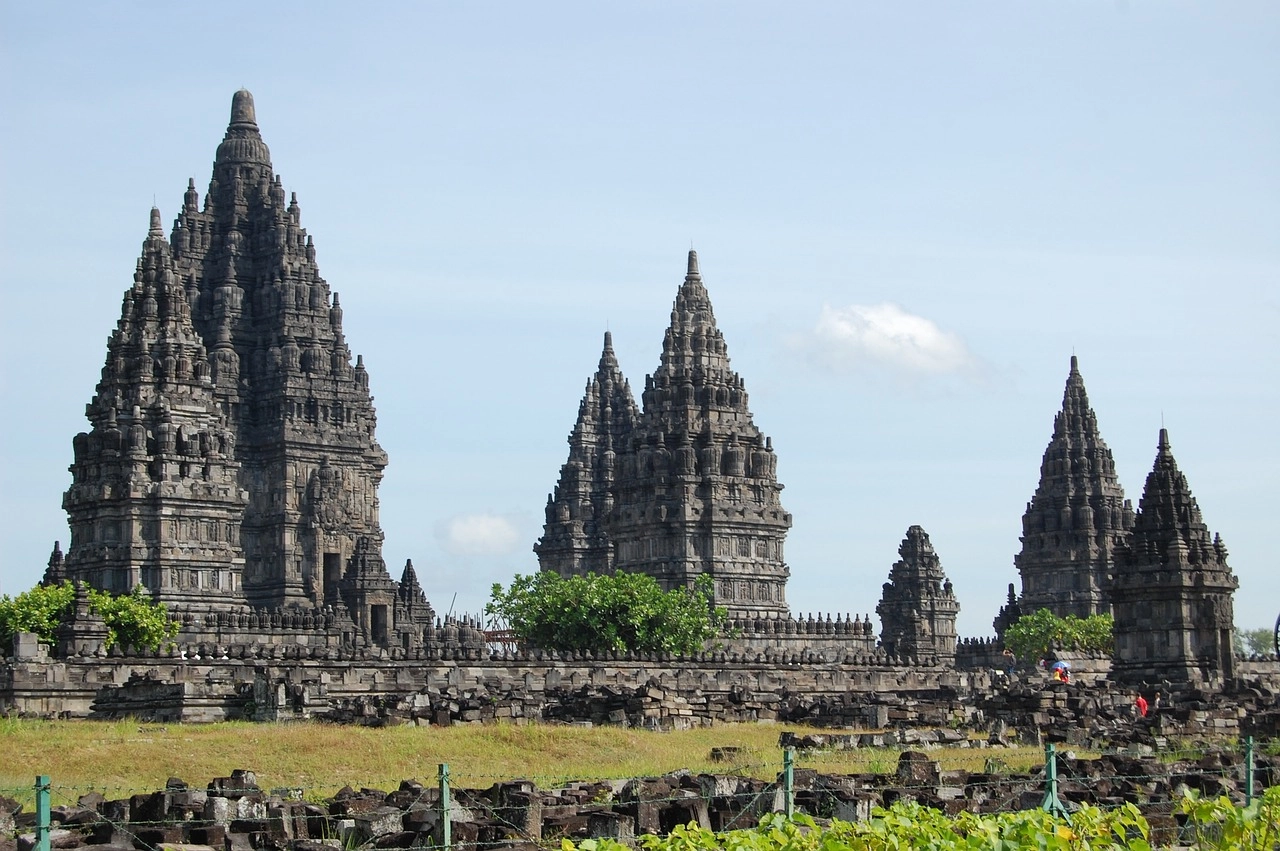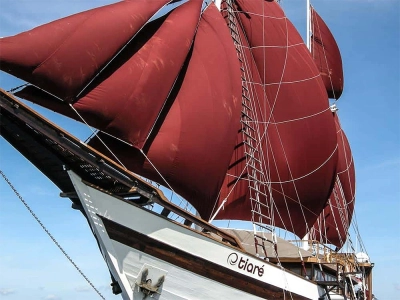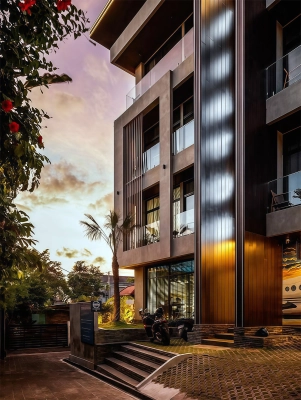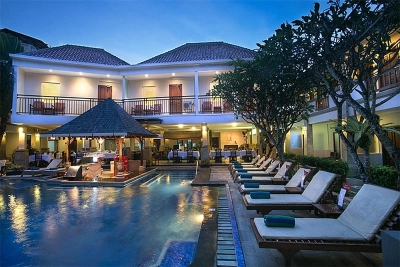Indonesia
 Table of contents
Table of contents
Indonesia is the largest archipelago in the world, spanning more than 5,200 km between mainland Asia and Australia. Half of all islands are inhabited. The most famous of them are Lombok, Bali, Java, Sulawesi, Timor, New Guinea - each of them is unique and inimitable, with its own traditions, beliefs and culture. It is also the world's largest Muslim country.
General information
The official name of the state is the Republic of Indonesia. The state covers an area of 1,904,569 km² (15th in the world). The population is approximately 289,918,600 (as of 2024), making it the fourth most populous country in the world.
More than 300 different ethnic groups live in the country. The largest of these are the Javanese, who make up about 42% of Indonesia's total population. Other major groups: Sundanese (15.4%), Malays (4.1%), Chinese (about 4%), Madurese (3.3%), Batak (3%), Bugis (2.9%), Minangkabau (2.7%). The many small ethnic groups living in Kalimantan and New Guinea comprise only a few hundred people. There are also peoples whose number reaches several tens of thousands of people, for example the Batin in the Jambi province on the island of Sumatra.
Indonesia is a secular state and the country's constitution guarantees freedom of religion. About 86.1% of the country's population are Muslims, 5.7% are Protestants, 3% are Catholics, 1.8% are Hindus, 3.4% are Buddhists and adherents of other religions. Most Hindus live on the island of Bali.
The people of Indonesia speak more than 700 languages. The official language is Indonesian, which is a modified version of Malay, used as a lingua franca for business and judicial proceedings, official documents, trade, etc. At the same time, a significant portion of Indonesians continue to use their native languages and dialects, the largest of which, by number of speakers, is Javanese. A number of urban Indonesians study English as a foreign language in schools.
The official currency of the country is the Indonesian rupiah.
Jakarta is the capital and largest industrial center of the country (over 27 thousand enterprises, including more than 8 thousand handicrafts). Jakarta has automobile assembly, textile, clothing, footwear, electronics, food, chemical, pharmaceutical, printing, glass, paper, woodworking, ship repair, shipbuilding, and metalworking industries. New industrial zones are being actively developed (Pulo Gadung, Anchol, Pulo Mas, Chempaka Putih, Gandaria, Pluit).
Jakarta is an important hub for highways, railways, air and sea communications. 13 km to the north is the port of Tanjungpriok (1877-1883) - the country's main container terminal. From here tea, cinchona bark, cassava, coffee, rubber, copra, palm oil, etc. are exported.
A plan is being implemented to move the capital from Jakarta to the city of Nusantara under construction on the island of Kalimantan.
Surabaya is the second largest city in Indonesia and the administrative center of the province of East Java. One of the main ports of the country, an important economic and infrastructural center. Large enterprises of the engineering, textile, oil refining and chemical industries are located here. The service sector and banking sector are developed.
Bandung is the capital of West Java province and is the third most populous city in Indonesia. Also located here were the country's largest quinine factory, a cannery, railway workshops, a rubber products plant, an automobile assembly plant and a radio engineering products plant.
Also, the largest cities in the country are Bekasi (there is a production site for Honda accessories, a General Motors automobile plant), Medan (the large port of Belawan is located here), Tangerang (there are more than 1000 factories), Palembang (chemical, textile, leather, food industry enterprises are concentrated here). industry, production of building materials).
Makassar is the largest port in southern Sulawesi with regular domestic and international sea services. The city is famous for its local Pinisi boats, which are capable of long-distance voyages.
Surakarta is an Indonesian city in the province of Central Java. Cultural and religious center, ancient center of Javanese culture.
Indonesia is divided into 38 first-level administrative-territorial units, including 36 provinces and two special administrative units with the status of a province - the Jakarta Special Capital Region and the Yogyakarta Special Region.
History, geography, culture, mentality
The history of Indonesia began with the birth of humanity. In ancient times, Indonesia witnessed the rise and fall of great empires that ruled almost all of Southeast Asia and played a key role in the history of the region. After gaining independence from foreign colonialists and two world wars, Indonesia became a single state that continues to develop at a rapid pace along with other countries of the world.
The remains of Homo erectus, also known as Java Man, and his tools were discovered during archaeological excavations at Sangiran in Central Java. This find suggested that the “first people” inhabited the Indonesian archipelago at least 1.5 million years ago. Recently, the remains of Homo floresiensis, or, as he was nicknamed, “the hobbit,” who is considered one of the ancestors of modern humans, were found in the Liang Bua cave on the island of Flores.
In Chinese chronicles there are references to the fact that already in the 1st century AD. There was active trade between India, China and the islands that are today the territory of modern Indonesia. The powerful maritime empire of Srivijaya in the south of Sumatra, whose possessions covered the sea areas around the island of Sumatra and the Strait of Malacca, from the 7th to the 13th centuries was the center of the teachings of Buddhism and was famous for its riches.
From 1294 until the 15th century, the power of the powerful Majapahit kingdom on the east coast of Java extended over most of the archipelago. Meanwhile, on other islands from Sumatra to Java and Bali, Kalimantan, Sulawesi, Ternate and the Moluccas, small and large sultanates developed and flourished, especially with the advent of Islam in the 13th century.
Following the arrival of the Italian merchant and traveler Marco Polo to Sumatra, in the 16th century several waves of European companies — Portuguese, Spanish, Dutch and British, — sought to take control of the lucrative spice trade from the Moluccas in the Indonesian archipelago. In 1596, Dutch ships anchored off the west coast of Java. Over the next three centuries, the Dutch gradually colonized the entire archipelago, and the captured possessions were called the Dutch East Indies.
At the beginning of the last century, a wave of discontent and resistance against the colonialists grew throughout the country. Indonesian youth in their 1928 manifesto called for building together “one state, one nation and one language.” regardless of the race, religion, language or ethnicity of the people in what was then called the Dutch East Indies.
Only on August 17, 1945, after the defeat of Japan in World War II, the people of Indonesia, led by leaders Sukarno and Mohammad Hatta, declared Independence. However, freedom was not easy for the young state. Only after five years of bloody struggle, in 1950, the Dutch government gave in and recognized Indonesian sovereignty.
The largest country in Southeast Asia by territory is located on the islands of the Malay Archipelago. The country includes at least 17,508 islands, of which about 6,000 are inhabited. In the northwest, the Strait of Malacca separates Indonesia from Malaysia and Singapore, in the northeast, the Sulawesi Sea borders the Philippines, and in the southeast, the Timor and Arafura Seas separate the state from Australia. Indonesia has land borders with Malaysia and Papua New Guinea.
The highest peak in Indonesia (aka — the highest peak in Oceania) — Mount Puncak Jaya (4884 m), located in the western part of New Guinea. The largest flat areas are found in Kalimantan. The largest lake — Toba in the northern part of the island of Sumatra (about 1145 km²), which is the largest volcanic lake on the planet and, with a depth of more than 500 m, is one of the deepest lakes in the world.
The predominantly mountainous terrain of the country complicates the development of the territory and transport connections. The archipelago has high volcanic and seismic activity — there are more than 100 active volcanoes and another 400 dormant.
Most of the lowlands are located along rivers and sea coasts. The largest islands in Indonesia — New Guinea, Kalimantan, Sumatra, Sulawesi and Java, where the capital Jakarta is located.
The archipelago is home to about 1,500 species of birds and at least 500 species of mammals, and the flora includes 40 thousand varieties of plants. Many representatives of the fauna are found in the wild only here and are listed in the Red Book. Komodo dragons, Kalimantan cats, pygmy killer whales — The fauna of Indonesia amazes with its unusual inhabitants.
The country is rich in various minerals. Oil reserves have been explored to varying degrees in almost all regions, in particular in Sumatra, Java, Kalimantan, Sulawesi, Seram, as well as on the shelf of these islands. Natural gas fields are located in North Sumatra (Arun) and East Kalimantan (Badak), as well as on the coastal shelves of West Irian and Java — the latter includes the largest gas field in Southeast Asia — Natuna D-Alpha, located in the Java Sea about 1000 km north of Jakarta. According to forecasts, the country's proven reserves of natural gas should last for 50 years. In addition, in various regions of the country there are significant reserves of coalbed methane, the total volume of which is about 13 trillion cubic meters. There are iron ore deposits in Kalimantan and Sulawesi.
The culture of Indonesia is unique. Numerous peoples of the country keep their traditions. Its “creators” — Buddhism, Hinduism, Christian trends brought from Europe, Muslim traders and preachers, as well as local beliefs and ideas about beauty. Indonesian folk architecture is represented by various types of housing: huts (Irian, Timor), light frame pile houses, large Dayak communal houses — aborigines of the island of Kalimantan, houses with high saddle-shaped roofs decorated with buffalo horns.
The temple complexes of Indonesia were erected at the dawn of the Middle Ages. The temples are decorated with carvings and sculptures; the country's most famous temple complexes are: Borobudur, Singasari and Prambanan in Java, Besaki in Bali, Padang Lewas in Sumatra.
During the colonial period in Indonesia, architectural forms and construction methods familiar to the colonialists were introduced, so in some places the country’s architecture resembles European: Dutch forts in Bukitting and Bengkulu, magnificent palaces in the Empire style in Jakarta and Bogor, modern buildings of the Institute of Technology in Bandung and schools "Stavia" in Jakarta.
Both life and ceremony use religious and mystical elements expressed in music and other forms of culture.
Performances depicting stories from the Indian epic Ramayana are popular in Bali.
The world famous shadow theater Wayang kulit (Wayang kulit), which was awarded world heritage status by UNESCO in 2004, originates in Indonesia. This art is especially developed in Bali and Yogyakarta.
The most recognizable and sought-after areas of Indonesia's national cultural heritage are painting, including batik, and wood carving.
Speaking about local culture and customs, it is impossible not to mention the kris daggers, which occupy a special place in the life of every man in Java and Bali. The dagger protects its owner and his entire family from evil spirits and has magical powers.
Islam has had an important influence on the culture and art of Indonesia.
Harmonious relationships, as well as religion, play a very important role in both the public and personal lives of Indonesians. Despite their low standard of living, they are very peaceful and friendly people living in harmony. Politeness is considered the most important factor in communication. Family — the center of life, so here it is customary to pay great attention to the development of intrafamily relationships.
In Indonesia, as in other Muslim countries, there is a ban on pork, alcohol and eating with the left hand, however, these rules are not observed so strictly. Here it is not customary to turn your back on an elderly or high-ranking person, to touch the head of another person, even a child, to show the soles of your shoes or the soles of your feet, or to touch other people with your feet. When entering a room, it is customary to take off your headdress. Loud speech is considered an insult in Indonesia.
Indonesians rarely invite you home. If you are invited, then you should take a small gift with you. When the owner or hostess enters the room, you must stand up. When eating, try not to leave anything on the plate, but to eat everything that you put in or was offered to you. Asking personal questions is indecent. Socializing is not allowed during meals. All conversations should be conducted before you sit down at the table, or after the meal.
Power
Indonesia is a unitary presidential republic. The basic law of the state is the constitution adopted in 1945.
The head of state and head of the executive branch of government is the president. In performing the duties of head of state, the president is assisted by the vice president.
The president forms and heads the government. The government includes coordinating ministers (supervising several ministries and departments), ministers (heading ministries), state ministers (heading various departments, or overseeing various government programs, or carrying out special assignments), Secretary of State (head of the presidential administration) and heads of departments who do not have a ministerial position, but are officially equal to ministers in status. The quantitative composition and structure of the government are not regulated by law and are determined by the president.
The highest legislative body is the People's Consultative Congress (PCC). The NCC, which is not a permanent structure, convenes in session at least once every five years and consists of two chambers: the Council of People's Representatives (CHR) and the Council of Regional Representatives (CRR).
The highest judicial power belongs to the Supreme Court.
Economy
Today, Indonesia is the 10th largest economy by purchasing power parity.
Indonesia is implementing a 20-year development plan covering the period from 2005 to 2025. This plan is divided into 5-year medium-term development plans called RPJMN (Rencana Pembangunan Jangka Menengah Nasional), each of which has its own set of development priorities. The current plan, the latest phase of a 20-year vision, aims to further strengthen Indonesia's economy by improving the country's human capital and its competitiveness in the global market.
Indonesia successfully completed its G20 Presidency in November 2022 and ASEAN Presidency in 2023, demonstrating leadership in representing the interests of developing countries and the ability to play a more active and strategic role in working with developed countries to achieve a sustainable recovery.
According to the World Bank's October 2023 economic report, Indonesia's economic growth is underpinned by rising private consumption and positive terms of trade. GDP growth is projected to reach 5% in 2023 and average 4.9% over the medium term in 2024-2026. However, the risks of a deterioration in the global economic situation are high and could affect the country's economic growth.
In Indonesia, climate change is likely to impact water availability, health and nutrition, the ability to manage disaster risks and urban development, especially in coastal areas, with implications for poverty and inequality. Indonesia contains the world's third largest tropical forest (94.1 million hectares) and is home to the world's largest tropical peatlands (14.9 million hectares) and mangrove forests (3.36 million hectares). These natural resources contain enormous amounts of carbon, which mitigates the effects of climate change, is critical to maintaining the livelihoods of Indonesians, and supports the country's long-term development.
Indonesia's economy differs significantly from its Asian neighbors such as Singapore and Thailand. In particular, it relies heavily on domestic activities rather than exports.
Indonesia has a market economy in which the government plays a significant role, including regulating the prices of some basic goods such as fuel, rice and electricity.
Despite ongoing challenges caused by global macroeconomic headwinds, Indonesia's economy has shown resilience in 2023. Lower commodity prices have negatively impacted critical industries, coupled with slower growth rates in key export markets. This was particularly evident in the three main export categories: mineral fuels, iron and steel, and animal/vegetable oils and fats, which together accounted for 43% of the country's export value in 2023. Consequently, the value of exports fell by 12.0% per annum, year on year to US$259 billion. With the government's clear commitment to tackling the global inflation crisis and economic downturn, and a large pool of young workers, Indonesia is well positioned to benefit from the global economic recovery.
Indonesia's main trading partners are Japan, China, Singapore and South Korea. Indonesia's most important export products are oil and gas, minerals, crude palm oil, electrical appliances and rubber products.
Business climate
In February 2021, the Indonesian government issued Government Regulation No. 5/2021, introducing a risk-based approach and simplifying the business licensing process for almost all sectors. The decree classifies business activities into low, medium and high risk categories, which will further determine the business licensing requirements for each investment.
Low risk business activities only require a Business Identifier (NIB) to begin commercial and production activities. The NIB also serves as an import identification number, a customs access identifier, a halal assurance statement (for low risk), and a statement of environmental management and monitoring capabilities (for low risk).
Medium risk sectors must obtain NIB and standard certification. According to the regulation, a standard certificate for medium-low risk is a self-proclaimed statement that certain business standards have been met, while a standard certificate for medium-high risk must be verified by the appropriate government agency.
High-risk industries must apply for full business licenses, including an environmental impact assessment (AMDAL). The business license remains valid as long as the business operates in accordance with Indonesian laws and regulations.
Investment climate
Indonesia is positioning itself as a leading destination for foreign investment, using its strategic initiatives in infrastructure development, special economic zones and renewable energy to attract more than US$50 billion in the next decade. Key policy points for the country include:
- commitment to strengthening and balancing the domestic economy through infrastructure development
- Focus on becoming a critical hub for foreign investors, with a focus on industrial and special economic zones
- strategic measures to attract significant foreign investment, including the establishment of the Indonesian Investment Authority (INA)
- strong momentum in the M&A market, especially in the telecommunications, technology and energy sectors
Indonesia is embarking on a major infrastructure modernization campaign, focusing on building roads, ports, railways and airports, as well as expanding telecommunications and broadband networks.
Development is not only concentrated on the island of Java. Efforts are being made to address uneven economic growth by optimizing infrastructure throughout the country, including the new capital Nusantara. The Indonesian government is actively seeking investment in transport infrastructure through public-private partnerships (PPPs) in an effort to modernize public transport and improve regional connectivity.
To position Indonesia as a key destination for foreign investors, the government has prioritized the development of industrial and special economic zones (SEZs). The goal is to attract more than US$50 billion in foreign investment over the next decade, focusing on SEZ-oriented manufacturing. Improved infrastructure such as highways, drainage systems, high-speed Internet and ports are critical to supporting these areas.
Indonesia is making significant strides in the energy sector, with a particular focus on the electric vehicle (EV) market. The government has ambitious plans to expand access to renewable energy and create downstream mineral extraction plants, especially those related to electric vehicles and their components. The initiative is expected to attract foreign electric vehicle manufacturers to set up factories in Indonesia, as well as the emergence of local players who will take advantage of the country's rich natural resources needed for the electric vehicle sector.
Indonesia's M&A market has seen record volumes since the pandemic, with growth continuing into 2021, 2022 and 2023. This momentum is supported by government initiatives focusing on key sectors such as telecommunications, technology, transport and energy. The Indonesian government has introduced new taxes and pricing rules to limit carbon emissions and effectively manage emissions in the forestry and land management sectors. In addition, the Indonesian Just Energy Transition Partnership (JETP) 2022 aims to support the energy sector transition in line with global warming targets.
Indonesia's comprehensive approach to infrastructure development, emphasis on renewable energy and the electric vehicle market, and the creation of a sovereign wealth fund by the Indonesia Investment Authority (INA) demonstrate the country's ambition to become a leading destination for global investors. These initiatives, coupled with a favorable investment climate, place Indonesia in a unique position in the global market, offering promising opportunities for foreign investors looking to realize the potential of the Southeast Asian region.
Business and investment support structures
Indonesia provides extensive business and investment opportunities supported by a number of government and private entities. Here are the main ones:
- BKPM (Indonesia Investment Coordination Agency). The main body responsible for promoting foreign investment. BKPM assists investors in the process of registering a business and obtaining the necessary permits.
- OSS (Online Single Submission) platform to simplify the business registration process.
- Ministry of Commerce of Indonesia. Responsible for regulating trade policy and supporting exports and imports. Provides information and support to entrepreneurs engaged in foreign trade.
- Regional Investment Agencies. Each province in Indonesia has its own agencies that provide assistance and advice to local and foreign investors. These agencies provide local insight and offer support at the regional level.
- Indonesian Chamber of Commerce and Industry (KADIN). A platform for interaction between business and government. Organizes business events, seminars and forums for entrepreneurs and investors.
- SME Development Fund. Provides financial support, advice and training for small and medium-sized enterprises (SMEs). Promotes innovation and business modernization processes.
- Banks and financial institutions. Banks such as Bank Indonesia provide financial products and services for businesses. Microfinance institutions and venture capital funds also play an important role in financing start-ups and SMEs.
- Entrepreneurship Centers and Incubators. Many universities and private organizations create incubators and accelerators to support startups. These centers offer mentorship, training and resources for aspiring entrepreneurs.
- Associations and unions of entrepreneurs. For example, the Association of Indonesian Exporters and Manufacturers (GPEI) and the Indonesian Association of Women Entrepreneurs (IWAPI). Provide platforms for networking, experience sharing and business support .
These structures create an enabling environment for business development and investment, providing the necessary support and resources for successful business in Indonesia.

Tags:

425,004,800 ₽

34,000,384 ₽
10,200,116 ₽
119,774,080 ₽

432,732,160 ₽


 New artıcles
New artıcles

 REAB Services
REAB Services
 News
News
 Useful tip
Useful tip

